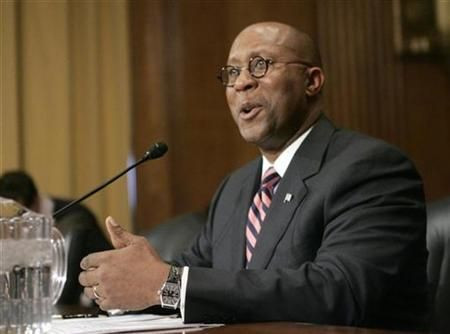Plenty of praise in the U.S. for South Korean FTA

Plenty of U.S. organizations are praising the newly-negotiated U.S.-Korea Free Trade Agreement (FTA), which is awaiting approval from lawmakers of both countries.
In early December, President Barack Obama and his South Korean counterpart Lee Myung-Bak settled on some contentious issues and finalize an updated version of the FTA more than three years after the first version was concluded.
This FTA with South Korea would be the largest for the U.S. in fifteen years and eliminate tariffs on over 95 percent of industrial and consumer goods within five years, thereby increasing trade between the two countries.
This is a big win for American employers and workers, said Congressman Dave Camp, a Republican from Michigan.
This is an important step forward to expand the reach of American exports, which will help create more American jobs, said House Majority leader Steny Hoyer, a Democrat.
The private sector seems equally happy.
This agreement will help create new economic opportunities for U.S. businesses, small and large, and jobs for Americans, said General Electric (NYSE: GE) CEO Jeff Immelt.
Implementation of this agreement with Korea will provide great opportunities for U.S. workers, businesses and farmers to increase exports and provide expanded services in this key market, said Vikram Pandit, CEO of Citigroup (NYSE: C).
These new provisions provide Ford greater confidence that we will be able to better serve our Korean customers, said Alan Mulally, CEO of Ford Motor (NYSE: F)
This agreement is seen as especially positive for the U.S. auto industry and will likely make bilateral auto trade more balanced. Last year, South Korea sold 500,000 cars in the U.S. and bought only 7,500 American cars in return, according to the Council on Foreign Relations (CFR).
However, one U.S. sector that may not be so enthusiastic is the beef industry.
South Korea made no concessions on its significant barriers to American beef exports, said Senator Max Baucus, a Montana Democrat.
Nevertheless, both the American Farm Bureau Federation and the USA Poultry & Egg Export Council endorsed the agreement.
One reason experts think this FTA is good for the U.S. jobs market is because South Korea has tough labor laws that virtually eliminate the risks of offshoring by American companies, said Edward Alden and Scott Snyder of the CFR. (When the U.S. opens trade with countries that have significantly lower wages and poor labor laws, companies are incentivized to shift jobs there to take advantage of more accommodative labor conditions.)
However, ratification by U.S. lawmakers of this FTA is not guaranteed, although many strongly support it.
One, isolated industries like beef and textiles are still not happy with it. Two, free trade is a particularly tough sell [politically] during times of economic difficulty, said Alden and Snyder.
Back in South Korea, where the agreement was met with more criticism, proponents of it will have to fight the allegation that its government, pressured by the U.S., gave away too many concessions.
Alden and Snyder admitted that the newly-negotiated FTA is certainly better for U.S. commercial interests than the first draft.
In the past decade, regional and bilateral FTAs have proliferated as the World Trade Organization's multilateral/global Doha Development Round has languished for nine years without producing a solution.
Email Hao Li at hao.li@ibtimes.com
© Copyright IBTimes 2024. All rights reserved.





















